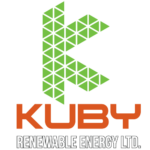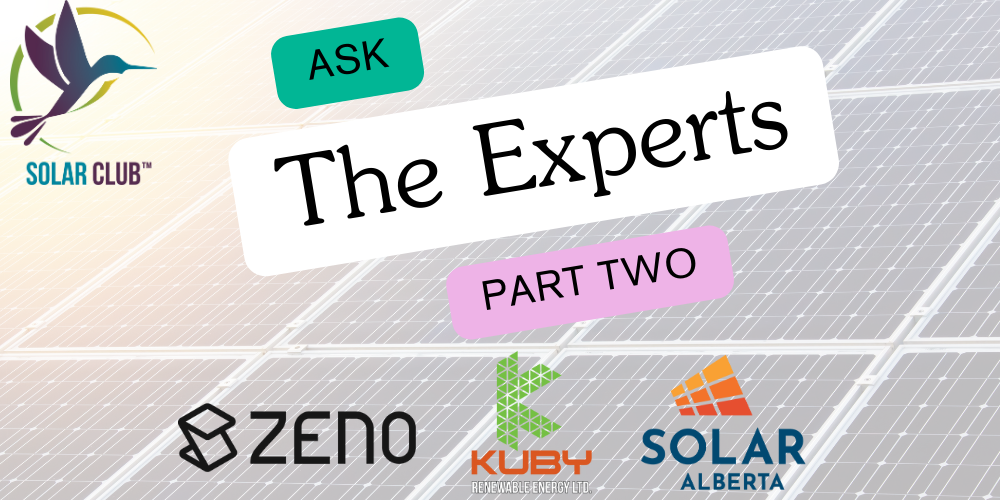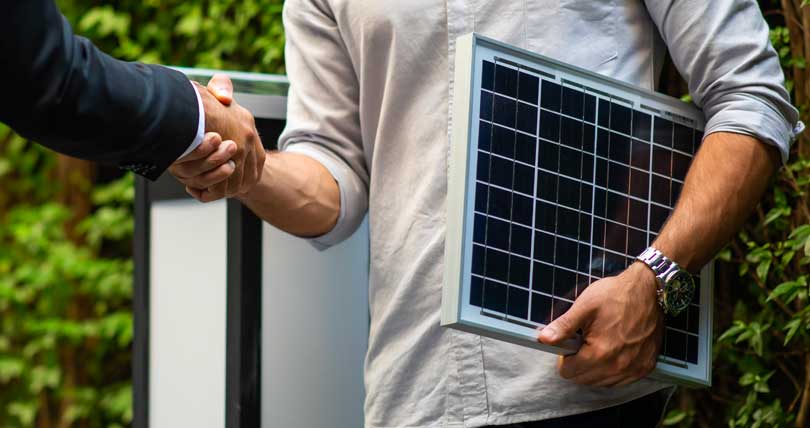Solar in Alberta: Ask the Experts Part Two
As we continue our deep dive into Alberta’s thriving solar industry, Part Two of our blog picks up where we left off, bringing you more valuable insights from our panel of experts. In this installment, we further explore the critical aspects of installing solar, providing detailed answers to the questions that matter most to you.
Stay with us as we continue to uncover the transformative potential of solar energy in Alberta. Dive into Part Two to complete your knowledge and get inspired to join the solar revolution in one of Canada’s sunniest and most forward-thinking regions.
Part Two of Ask the Experts can be found below. If you missed Part One, click here.
Solar Club: There have been some changes to the Canada Greener Homes Grant program. What grants or funding are available for people looking to install solar on their homes?
 Kuby Renewable Energy: While the Canada Greener Homes Grant has stopped accepting new applications, there is potential for new grant programs in the future. Changes in available grants and funding can happen rapidly, so it’s advisable to stay informed on the latest updates from the government.
Kuby Renewable Energy: While the Canada Greener Homes Grant has stopped accepting new applications, there is potential for new grant programs in the future. Changes in available grants and funding can happen rapidly, so it’s advisable to stay informed on the latest updates from the government.
If you are considering installing solar on your home, the interest-free loan can provide significant financial relief and make solar installation a viable option for many homeowners.
One can also sell the carbon offset credits as another source of revenue, which is a relatively new bonus offering to consumers.
![]() Zeno Renewables: Today, Canadian homeowners that want to go solar can take advantage of the Canada Greener Homes Loan. Canadians can borrow up to $40,000 and receive interest-free financing for up to 10 years. Many of our clients don’t typically use up the full loan amount when going solar alone but they can maximize this opportunity by combining the loan with other eligible energy-efficient retrofits.
Zeno Renewables: Today, Canadian homeowners that want to go solar can take advantage of the Canada Greener Homes Loan. Canadians can borrow up to $40,000 and receive interest-free financing for up to 10 years. Many of our clients don’t typically use up the full loan amount when going solar alone but they can maximize this opportunity by combining the loan with other eligible energy-efficient retrofits.
![]() Solar AB: While the Canada Greener Homes Grant is currently unavailable, there are a few other financial incentives available to encourage solar adoption. We have a full list of available incentives on our website here. Two incentives of note are:
Solar AB: While the Canada Greener Homes Grant is currently unavailable, there are a few other financial incentives available to encourage solar adoption. We have a full list of available incentives on our website here. Two incentives of note are:
- The Canada Greener Homes Loan. This is an interest-free loan of up to $40,000.
- The Alberta Clean Energy Improvement Program which is available in 19 different municipalities. This is a low-interest loan for energy efficiency upgrades that is tied to the property rather than you as a homeowner. This means that if you were to move you would no longer be responsible for paying back the loan, the new property owner would be.
Solar Club: Customers often ask us if the quotes they’ve received are reasonable. What is a reasonable dollar per watt for an average solar PV system? Is there a reasonableness test they can apply?
 Kuby: When it comes to evaluating the reasonableness of quotes for solar PV systems, there are various factors to consider that can impact the cost per watt. These factors include:
Kuby: When it comes to evaluating the reasonableness of quotes for solar PV systems, there are various factors to consider that can impact the cost per watt. These factors include:
- Size of the Solar System: Larger systems may benefit from economies of scale and thus have a lower cost per watt.
- Number of Roof Faces: Systems that span multiple roof faces may require more complex installations and could incur additional costs.
- Steepness of the Roof: Steeper roofs may present more installation time, potentially leading to higher installation costs.
- Municipal Location: Local permitting, regulatory requirements, and regional variations in labour and permitting costs can influence pricing.
- Scope of Work: Additional tasks such as adding subpanels or other electrical work can impact the overall cost.
Given these variables, a reasonable cost per watt for an average solar PV system on a pitched roof can range from $2.15 to $3.80. To assess whether a quote is reasonable, customers should compare quotes from multiple reputable providers, ensuring that all quotes include similar scopes of work, system sizes, and equipment quality.
![]() Zeno: When assessing the reasonableness of quotes for solar PV systems, it’s important for customers to consider several factors that can impact the cost per watt ($/W). Generally, the price range for an average solar PV system is between $2.50/W and $3.50/W. However, this can vary based on numerous factors. When getting quotes from different solar companies, in addition to what was mentioned above, it is important to keep the following information in mind:
Zeno: When assessing the reasonableness of quotes for solar PV systems, it’s important for customers to consider several factors that can impact the cost per watt ($/W). Generally, the price range for an average solar PV system is between $2.50/W and $3.50/W. However, this can vary based on numerous factors. When getting quotes from different solar companies, in addition to what was mentioned above, it is important to keep the following information in mind:
- Component Quality: Higher quality components typically cost more but may offer better efficiency and longevity. This can affect the upfront cost but potentially save money in the long run.
- Warranty and Support: Systems with longer warranties and robust customer service can command higher prices. These features offer peace of mind and potential savings on future repairs.
- Safety and Protection Features: Including high-quality safety shutdowns and rodent guards can raise the price but are essential for protecting the system and maintaining its efficiency.
- Quality of Installation Materials: The type of materials used (e.g., PVC vs. Teck Cable) can influence both the cost and longevity of the system. Higher quality materials usually cost more but might offer better durability and performance.
- Installation Team: The choice between using subcontracted labour or in-house certified electricians can affect both the quality of the installation and its cost. In-house teams may offer more consistent quality but could be more expensive.
- Company Support Structure: Companies with dedicated service teams typically charge more, but this can be beneficial for ongoing maintenance and troubleshooting.
Customers can apply a “reasonableness test” by evaluating quotes based on these factors:
- Compare Component Quality: Check if the components used are from reputable manufacturers with good reviews.
- Assess Warranty Terms: Look for longer warranty periods and comprehensive coverage.
- Examine Company Reputation: Consider the installer’s reputation, reviews, and the presence of a dedicated support team.
- Review Installation Details: Understand the specifics of the installation, such as the materials used and the complexity of the work.
- Check for Hidden Costs: Ensure that the quote includes all potential costs like electrical upgrades and safety features.
![]() Solar AB: A typical solar system on a home in Alberta can range from $15,000 – $30,000 depending on the size, location, roof specs as well as a variety of other factors. We recommend soliciting at least three quotes as well as references and proof of insurance before choosing a solar installer. If folks want to do more of a deep dive into pricing considerations, we suggest looking at the Alberta Solar Calculator and/or downloading our Economics of Grid-Tied Solar PV course.
Solar AB: A typical solar system on a home in Alberta can range from $15,000 – $30,000 depending on the size, location, roof specs as well as a variety of other factors. We recommend soliciting at least three quotes as well as references and proof of insurance before choosing a solar installer. If folks want to do more of a deep dive into pricing considerations, we suggest looking at the Alberta Solar Calculator and/or downloading our Economics of Grid-Tied Solar PV course.
Solar Club: What should consumers be looking for when they receive a quote from a solar installer?
 Kuby: When consumers receive a quote from a solar installer, there are several key factors they should examine to ensure they make an informed decision:
Kuby: When consumers receive a quote from a solar installer, there are several key factors they should examine to ensure they make an informed decision:
- System Size and Design: Compare the number of panels each installer proposes and assess their arrangement on your roof. Some inexperienced contractors may place panels over vents or too close to the roof edges, which can cause problems down the line. A thoughtful, efficient layout is key.
- Products and Warranties: Compare the type of panels and inverters being quoted as well as corresponding warranties. For example, micro inverters with panel level production and monitoring are widely considered more favourable to a string inverter option. Confirm that the product manufacturers are bankable Tier 1 companies, so you know you’ll have support if needed.
- Contractor Qualifications: Research the reputation of the installer. Look for evidence of their qualifications, such as positive reviews, successful project examples, and responsiveness to your questions. Reputable contractors should be knowledgeable and able to explain the system and installation process clearly.
- Scope of Work: Assess the scope of work each installer provides. For example, check whether they include a subpanel if necessary. Ensure each quote offers comparable services so you can make an apples-to-apples comparison.
- Compliance and Insurance: Ask the installer for compliance documents, such as WCB and liability insurance, to ensure they are operating legally and responsibly. This also protects you in case of any unexpected issues.
- Safety Certification: Consider choosing a company like Kuby Renewable Energy that is COR-certified for safety, demonstrating our commitment to safe work practices and solidifying our position as a top solar provider in Western Canada.
![]() Zeno: There are many key factors homeowners should consider when getting solar quotes. Building off this list, you should also consider:
Zeno: There are many key factors homeowners should consider when getting solar quotes. Building off this list, you should also consider:
- Total cost of the installation: The cost of the installation extends beyond what products are being used and what is included. Therefore, it is important to consider the total cost of going solar such as the products used, what’s included in the installation (permits and materials), quality of the company’s craftsmanship, warranties, and the aftercare of what you can expect when the project is done. At Zeno, we are confident in the products we source, the training we provide our in-house electricians, and our solar designs that we offer a Lifetime Craftsmanship Warranty and a Money-Back Production Guarantee to all of our customers.
- Timeline and Installation Process: Clarify the timeline for installation and the process involved. A reliable installer should provide a clear schedule and communicate any potential delays or challenges.
- Incentives and rebates: Typically, a reputable installer will know what incentives and rebates are available to help offset the cost to make going solar more affordable.
![]() Solar AB: We have a number of resources available on our website to help you reach the right installer! Here are the resources we recommend:
Solar AB: We have a number of resources available on our website to help you reach the right installer! Here are the resources we recommend:
- Our Installations Near You map will give you an idea of what companies folks near you used for their solar installation and how experienced various companies are.
- Our Solar Directory. This is a listing of all solar companies who are members with Solar Alberta, and therefore are required to abide by our Business Code of Conduct. The directory can tell you about various services provided as well as commitments and certifications that might be of interest to you.
- We have a Request for Proposal section on our website. If you fill out the form, our members will be able to approach you with quotes for the installation.
To ensure you find the right installer, we have compiled this list of recommended tips and tricks. These are a few of the most important tips:
- Soliciting at least three quotes from installers
- Requesting references and proof of insurance
- Determining how long the warranties are for the products and their workmanship
Solar Club: How has the Solar Club benefitted your customers/members?
 Kuby: The Solar Club has provided significant benefits to our customers by helping them maximize their solar energy savings. On average, customers save an additional $300 to $500 per year, which represents a notable increase in savings beyond what solar energy alone could offer. By taking advantage of the Club’s offerings, customers can optimize their solar power systems and make their transition to renewable energy even more cost-effective and rewarding.
Kuby: The Solar Club has provided significant benefits to our customers by helping them maximize their solar energy savings. On average, customers save an additional $300 to $500 per year, which represents a notable increase in savings beyond what solar energy alone could offer. By taking advantage of the Club’s offerings, customers can optimize their solar power systems and make their transition to renewable energy even more cost-effective and rewarding.
![]() Zeno: We recommend the Solar Club rate to clients who are high export producers of solar during the spring and summer months. This is financially advantageous as it builds them a bigger credit during this time period and it allows them to reach a faster payback for their system.
Zeno: We recommend the Solar Club rate to clients who are high export producers of solar during the spring and summer months. This is financially advantageous as it builds them a bigger credit during this time period and it allows them to reach a faster payback for their system.
![]() Solar AB: Solar-specific retail plans have served as an additional financial incentive for folks to adopt solar energy in the province. Due to the nature of these pricing plans, which allow folks to opt into different electricity rates (higher during the summer and lower during the winter), microgenerators are able to speed up their Return on Investment. These programs have been particularly important during periods where grants and rebates are not available. Not only do solar-specific retail plans benefit our individual microgenerating members, but they also benefit our Business Members. Our business members have a more steady customer base due to the steady financial incentive of these retail plans.
Solar AB: Solar-specific retail plans have served as an additional financial incentive for folks to adopt solar energy in the province. Due to the nature of these pricing plans, which allow folks to opt into different electricity rates (higher during the summer and lower during the winter), microgenerators are able to speed up their Return on Investment. These programs have been particularly important during periods where grants and rebates are not available. Not only do solar-specific retail plans benefit our individual microgenerating members, but they also benefit our Business Members. Our business members have a more steady customer base due to the steady financial incentive of these retail plans.
***
Thank you very much to our respective experts for taking the time to provide us with a wealth of information. For more information from our experts, check out their websites:




